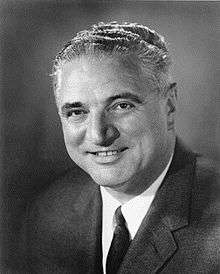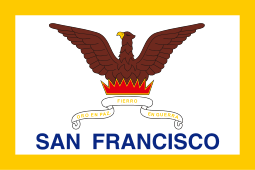George Christopher
| George Christopher | |
|---|---|
 | |
| 34th Mayor of San Francisco | |
|
In office January 8, 1956 – January 8, 1964 | |
| Preceded by | Elmer Robinson |
| Succeeded by | John F. Shelley |
| Personal details | |
| Born |
George Christophelis December 8, 1907 Karyes Lakonias,(aka Arahova Lakonias) - Municipality of Sparta, Greece |
| Died |
September 14, 2000 (aged 92) San Francisco, California, U.S. |
| Political party | Republican |
| Spouse(s) | Tula Sarantitis |
| Profession | Accountant, businessman |
George Christopher (December 8, 1907 – September 14, 2000) was a Greek-American politician, and the 34th Mayor of San Francisco, serving in that office from January 1956 until January 1964. He is to date the last Republican to be elected mayor of San Francisco; all San Francisco mayors since he left office have been Democrats.
Biography
Early years
Born George Christophes in Arcadia, Greece, the son of James and Mary (née Koines) Christophes. He and his family emigrated to the United States in 1910 and settled in San Francisco's South of Market Street neighborhood, then known as "Greektown", when Christopher was two years old. Christopher left day school at the age of fourteen when his father James died, and he became sole support of his family. He sold papers, then talked his way into a job at the San Francisco Examiner as a copy boy. In 1935, he married Tula Sarantitis, daughter of a baker for whom George did bookkeeping. After studying accounting at Golden Gate College, from which he earned a BA in Accounting in 1930, he worked for numerous small firms keeping their accounts and eventually bought out a small dairy on Fillmore Street, which became the Christopher Dairy.
Career
A liberal Republican,[1] Christopher began his political career in 1945 when he was elected to the San Francisco Board of Supervisors; on re-election, he became board president. Christopher ran for Mayor in 1951 and lost to incumbent mayor Elmer Robinson, but was eventually elected mayor in November 1955, taking office the following January. He hosted the Republican National Convention at the Cow Palace in August 1956 which renominated President Dwight D. Eisenhower. He was re-elected in 1959 for a second term.
Christopher was instrumental in bringing the New York Giants baseball team to San Francisco in 1958 (where they became the San Francisco Giants) and in securing the funding to build Candlestick Park, on the abandoned lands of Sunset Scavenger on Candlestick Point; the ballpark opened for the Giants 1960 season. His administration has been credited with the building of the Brooks Hall, twelve new schools, seventeen firehouses, six public swimming pools, the five-story Fifth and Mission and the underground Civic Center garages.[2]
Christopher was known for his strong stand on civil rights; his childhood experience of anti-Greek sentiment informed his stand. He gained worldwide headlines offering his home to Willie Mays after it was reported that a Forest Hill realtor had refused to sell to Mays. Christopher also lobbied and succeeded in opening mental health and alcohol treatment centers under city funding.
Christopher presided over the redevelopment of major portions of city and private lands, labeled slums, some not without controversy; Embarcadero Center and Golden Gateway, displacing the old wholesale produce market from the filled land southeast of Telegraph Hill to the Alemany location where it remains, Japantown and the Fillmore urban renewal that displaced the African-American and the remnants of the Jewish Community for concrete highrises, the new Hall of Justice and the opening of the Embarcadero Freeway, which blocked the Embarcadero and Ferry Building from the city, spawning the first Freeway Revolt.
Another controversial issue was the loss of the historic Fox Theatre movie palace on Market Street at Polk Street. In early 1963, the owners of the Fox closed the theatre, and offered it for sale to the city of San Francisco for $1,050,000. Mayor Christopher turned this down, and demolition of the Fox proceeded; by August, the theatre was gone. Theatre historians worldwide agree that the San Francisco Fox was one of the most magnificent movie palaces ever constructed. Movie palace fans still mourn the theatre's loss over 45 years later, longer than the building actually existed.
In Christopher's second term, the House Subcommittee on Un-American Activities held hearings in the City Hall supervisor's chambers. A large group of students and active citizens were fire-hosed down the marble steps inside City Hall rotunda by the San Francisco Police Department when they protested their exclusion from admission to committee hearings. Christopher later told the Federal Government they were no longer welcome in city buildings, but he sided with the committee and spoke for the propaganda newsreel-style film made by the committee about the event titled, Operation Abolition,[3][4][5][6] that blamed Communists for the so-called City Hall riot of May 13, 1960. Christopher was criticized for endorsing the film while saying that "at least 90% of the students were not organized by the Communists."[7]
In 1958, Christopher was defeated in the Republican primary for U.S. Senate by Governor Goodwin Knight. In 1962, when Richard Nixon ran for governor, Christopher ran for lieutenant governor, losing to incumbent Democrat Glenn Anderson. He lost the 1966 Republican primary for Governor of California to former actor and conservative icon Ronald Reagan.
References
- ↑
- ↑ Carl Nolte (September 15, 2000). "George Christopher 1907–2000: Big-Thinking S.F. Mayor Of '50s and '60s Is Dead". The San Francisco Chronicle. Retrieved August 24, 2010.
- ↑ "Operation Abolition," 1960 on YouTube
- ↑ "Operation Abolition" (1961), time.com; accessed September 12, 2015.
- ↑ Operation Abolition (1960) on YouTube
- ↑ "Operation Abolition", video.google.com and Time magazine, Friday, March 17, 1961.
- ↑ Staff (March 17, 1961). "The Investigation: Operation Abolition". Time. Retrieved August 24, 2010.
Further reading
- Dorsey, George (1962). Christopher of San Francisco. New York: MacMillan Company. LCCN 62013596.
- Gladys Hansen (September 14, 2000). "George Christopher (1907–2000)". Virtual Museum of the City of San Francisco. Archived from the original on July 27, 2010. Retrieved 2010-05-07.
- Oral history interview on California politics
